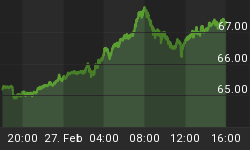With investors now emerging from a state of panic after the harrowing losses of late July and August, stock markets are now rising and gold is finally falling after a record run that pushed its price north of $1,900 per ounce. The buoyant mood is largely undergirded by the hope that on this Friday, August 26th, Fed Chairman Ben Bernanke will announce another round of stimulus to stop the U.S. economy from slipping back into another recession.
In contrast to this American expectation for more monetary manna from the heavens, many Eurozone governments have instituted harsh austerity programs. But behind the scenes the European Central Bank (ECB), in direct contradiction to the EU formation treaty, continues to enact a rescue package that purchases billions of dollars of subpar Eurozone sovereign debt. But at present, few governments or large financial players care much for legality.
As just about everyone knows, the lion's share of the bailout funds used by the ECB comes from Germany. However, the assumption that Germany will continue to provide these rescue funds depends not on German politicians and public opinion, as most investors think, but on the crucial judicial review of Germany's Federal Constitutional Court.
Unlike the U.S. Supreme Court, the German high court is not an appeals court. It conducts detailed proactive judicial review of all German Government actions. In its field, it is supremely powerful. The citizens of many countries, including those of the US, UK and EU may wish they had such an effective curb on the abuse of constitutional power by national governments. Indeed, it could be argued that had such a court existed in the US, UK, and EU, most of our current political, economic and financial woes would not exist.
In addition to its prodigious power, the Federal Constitutional Court of Germany is physically sited in Karlsruhe, well away from any 'persuasion' in the political center of Berlin or the financial center of Frankfurt. The Court is truly independent and has ruled quietly, often against government actions. Quite recently, it ruled that the EU had a serious "democratic deficiency." As a result, it ruled that many EU rulings would have no effect in Germany until they had been debated fully by the German Parliament. Unlike the courts of many nations, this one is no political pushover.
German bailouts have been central to all proposed "solutions" to the European sovereign debt problem. Defaults from even small Eurozone states would be a threat to many huge international banks that either hold significant amounts of Euro sovereign debt or have exposure to it by way of credit default swaps or interbank relationships. Still more important, continued German bailouts are of singular importance to the survival of the euro-the world's second currency, which forms much of the exchange reserves of major central banks and corporations worldwide.
In short, if the salvage of many Eurozone nations is not led by German bailout money, the euro may well collapse, threatening the world's major banks and many governments.
The Federal Constitutional Court of Germany is due to issue a judicial ruling on September 15 regarding the Constitutional legitimacy of the German Government's spending of citizens' money to bailout foreign nations. The future of the euro, the international banking system, and even of the entire socialist European Union experiment, can hang on the Court's decision.
Given the importance of such a ruling, it is surprising that the proceedings have been largely ignored by the mainstream media. However, if more market participants were aware of how an adverse ruling from the Court would throw a monkey wrench into the entire bail-out apparatus, the mood would be quite different in stock markets on both sides of the Atlantic. If German bailout spigots are tightened, financial stocks should plummet and the euro could fall sharply. In contrast, Swiss francs, Yen, Sterling and even for a short time the US dollar, may rise. But the biggest impact could be in the precious metals market.
So keep your eye on German legal news. It may make more impact on your portfolio than you ever could have imagined.
Subscribe to Euro Pacific's Weekly Digest: Receive all commentaries by Peter Schiff, Michael Pento, and John Browne delivered to your inbox every Monday.
Click here for free access to Euro Pacific's new special report: What's Ahead for Canadian Energy Trusts?
For a great primer on economics, be sure to pick up a copy of Peter Schiff's hit economic parable, How an Economy Grows and Why It Crashes.















